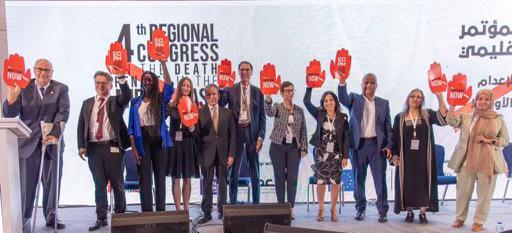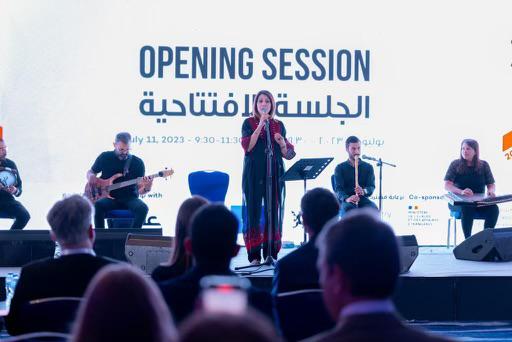Amman conference reiterates calls to abolish death penalty
Published: 2023-07-12 18:29
Last Updated: 2025-02-26 02:19
Editor: Laith Weinberger

Human rights activists, legal professionals and academics from 15 countries reiterated their calls on Wednesday to abolish or freeze the death penalty across the Middle East.
At the closing of a two-day congress in Amman, panelists drafted a declaration, appealing to regional governments, which called for the development of plans to abolish the death penalty “by reducing its scope for all types of crimes,” according to a press release.

In the declaration, delegates also called for a stronger commitment to protest the death penalty and invited young people to mobilize.
An estimated 200 participants from around the world attended the congress, organized by Together Against the Death Penalty (ECPM), an NGO based in France, and its partners at Penal Reform International and the Adaleh Center for Human Rights Studies. It is the second congress hosted in Jordan and the fourth in the region.

ECPM Director of Communications Bertin Leblanc told Roya that the declaration is a way to “make the message stronger.”
Jordanian human rights activist Hadeel Abdel Aziz said in a panel that Jordan’s legislation is good compared to other countries in the region but is “insufficient.” She urged officials to amend outdated laws mandating capital punishment.
Drewery Dyke, a chairperson of the UK-based Rights Realization Centre, told Roya there are “positive signs” that Jordanian and Lebanese authorities will abolish the death penalty.
There has been a temporary moratorium in Lebanon since 2004 halting all executions, though some have still received death sentences.
At the same time, excluding China, Amnesty International estimates that Iran, Saudi Arabia and Egypt were solely responsible for 90 percent of known executions in 2022.
“The death penalty remains a challenge in the region. There are, nevertheless, hopeful spots,” Dyke said.
In Jordan, executions were suspended from 2006 to 2014, and they have slowed since then. Authorities, however, did execute 15 prisoners in 2017, most of whom were convicted of terrorism charges, and 11 in late 2014.
Jordan voted in favor of a 2022 moratorium resolution in the United Nations, showing a willingness to stop executions.
ECPM Executive Director Raphaël Chenuil-Hazan said in an interview with Roya that Amman was the best place to have discussions about the death penalty, given positive developments.
Lawyer Javaid Rehman, and Saloua Boukaouit from the Bahrain Centre for Human Rights, pointed to unjust criminal systems in Pakistan and Bahrain, respectively.
“When it comes to the administration of justice in Bahrain, we find ourselves grappling with the question if the system truly guarantees fair trials for those facing the death penalty,” Boukaouit said in a panel.
“The organizers, ECPM and others, realized that this region is the most in danger when it comes to the death penalty,” Sherif Azer, Head of Policy at the Egyptian Commission for Rights and Freedoms, told Roya.
“We tell society not to kill people, but then we, the state, kill people,” Dyke said. “It makes a mockery of the ethics that lie at the heart of justice.”
In the future, according to Chenuil-Hazan, ECPM plans to speak with more government officials and organizations in Amman to ensure that Jordan votes again to support a moratorium.
Leblanc told Roya that the conference is a “first step.” He added, “It’s quite a big achievement in many ways; that conversation has never taken place.”
Researcher Nadine Moubarak emphasized the importance of a shift in how the public views the death penalty. “I don’t think that the actual solution will be just to amend the laws,” Moubarak said.
Azer said he expected to see fewer executions in coming years, fewer charges that are eligible for the death penalty and more protections for certain groups, including women and children.
“It is essential to continue constructive dialogue and advocate for comprehensive reforms,” Boukaouit said during a panel discussion.
“The death penalty is one of the most horrible heritages of human history that is still ongoing,” Azer said. “It is very important that it doesn’t exist in the near future, for the better of humanity.”


